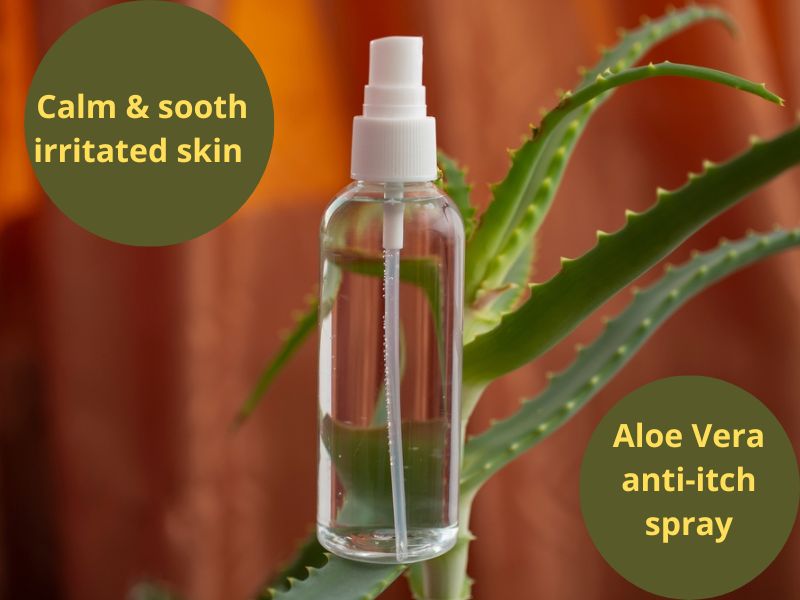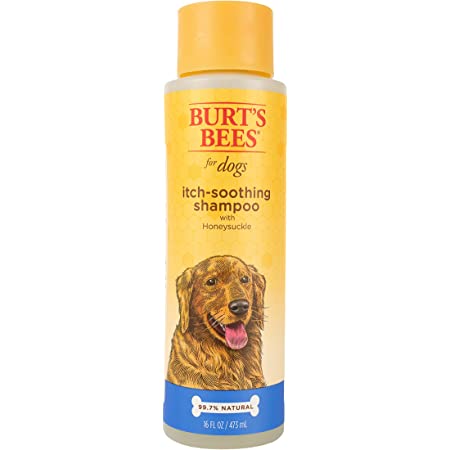The number of dogs diagnosed with itching is still rising. Between 2013 and 2019, veterinary visits due to itching dogs increased by 50%. According to veterinarians, allergies, infections, and parasites are dogs’ leading causes of itching. Although there are several commercial anti-itch remedies for dogs, homemade sprays are more cost-effective and easy to use.
Some homemade anti-itch sprays for dogs include aloe vera, apple cider vinegar, baking soda, anti-itch dog shampoo, and DIY hydrocortisone sprays. Spray your dog’s dry and irritated skin 1 to 4 times daily. The homemade anti-itch spray for dogs has antioxidants and other essential nutrients to heal bald spots and skin irritation.
In this article, I will give you the five best homemade anti-itch sprays for dogs, how to make them, and their benefits to your dog. These remedies will reduce dog itching within 12 to 48 hours in mild cases. If the itching is severe, take your dog to the vet.
5 Best homemade anti-itch sprays for dogs – recipes
Here are some of the best homemade anti-itch sprays for dogs:
1. Aloe vera

Aloe vera is a natural spray for itch relief in dogs. It is known for its cooling effect, which fastens the repair of skin tissues in dogs. Aloe vera has antimicrobial components that kill harmful bacteria, thereby preventing itchy skin for dogs.
Buy fresh aloe leaves from your nearest grocery store. You can plant it in your garden or keep it in the house. Extract a cup of aloe vera gel and mix it with 50 percent water. Pour the resulting mixture into a spray bottle and spray the mixture on the itchy area to relieve the pain.
You can also apply aloe vera gel directly to the affected area without mixing it with water. Massage aloe vera gel into the skin to penetrate your dog’s itchy skin. Use aloe vera leaves for a maximum of 3 days.
Do not apply aloe vera gel on open wounds or sensitive skin because it will sting and increase irritation.
2. Apple cider vinegar
Apple cider vinegar (ACV) is a homemade anti-itch spray for dogs. It has antibacterial and antifungal properties, which are essential for itchy skin. Apple cider vinegar is quite acidic. It will help balance the pH of your dog’s skin.
Mix 50% of raw apple cider vinegar with 50% water and pour the solution into a spray bottle. If your dog does not like the strong scent of apple cider vinegar, reduce the ratio of apple cider vinegar to the water. Use the mixture on your dog twice a week.
The apple cider vinegar will help with itching dog skin and repel parasites such as fleas and ticks from the dog’s fur.
However, do not spray your dog in the eyes as the vinegar can cause significant eye redness and some inflammation.
3. Baking soda and coconut oil
Baking soda is a good cleaning product with no harmful chemicals and poses no harm to your dog’s skin. It has anti-inflammatory properties that give it a soothing effect and makes it an effective dog itching relief. You can use it as a spray or a paste on the affected area.
Mix water and baking soda at 50 percent each until it forms a thick paste. Apply the thick paste to the affected area for about 25 minutes. Rinse the paste using clean water and moisturize the rinsed area with coconut oil.
Aside from using a thick paste, mix 6 tablespoons of baking soda with 1 liter of water. Stir the mixture thoroughly, add 6 drops of coconut oil to the mixture, and pour the mixture into a spray bottle. Spray the mixture to your dog’s skin, taking note of the itchy area.
Baking soda and coconut oil can dry out rashes. It can also reduce inflammation and redness on your dog’s skin.
4. Anti-itch dog shampoo

Anti-itch dog shampoo is a natural spray for itch relief that you can make at home. Mix the best anti-itch dog shampoo using apple cider vinegar, aloe vera gel, glycerin, and baby shampoo in the ratio of 3:6:1:3.
Bathe your dog with the shampoo two to three times weekly until the dog is fully recovered.
The shampoo has a strong hydrating effect on your dog’s coat, which soothes and moisturizes the skin. The anti-itch dog shampoo also leaves the dog smelling nice since it is scented.
The shampoo is suitable for sensitive dogs because it is made with natural ingredients and is recommended for dogs of all ages.
Store the rest of your shampoo solution in a cool and dry place or in a refrigerator to increase its lifespan. Storing in a fridge cools the shampoo and makes it more effective against itching.
5. DIY spray for dogs
To make a DIY natural spray for your dog, you will need:
- A cup of water
- A cup of chamomile tea
- A cup of apple cider vinegar
- A spray bottle
- 6 drops of lavender oil
- A mixing container
Chamomile tea has a cooling sensation property to provide relief for itchy skin. Apple cider vinegar is anti-fungal. Therefore, it stops the itching dog skin associated with yeast infections. Lavender oil has an antihistamine property that reduces inflammation due to allergic reactions.
Brew a cup of chamomile tea in boiling water, let it cool, and pour it into the mixing container. Add a cup of apple cider vinegar and stir while adding the other ingredients. Transfer the mixture into a spray bottle to make the application easy.
Spray the DIY natural spray on the affected areas of your dog’s skin. Massage it to penetrate the skin of your dog. While on it, take precautions not to apply the spray to open wounds or your dog’s mouth and eyes.
Severe itching in dogs may require veterinary services.
When to take your dog to the vet
Here are some instances when you should take your dog to the vet:
1. Anaphylaxis

Anaphylaxis is a kind of allergic reaction that causes severe itching in dogs. You will know your dog has anaphylaxis by looking at the dog’s skin and behavior. Is your dog’s skin turning red and swelling? Is your dog drooling excessively?
If yes, then your dog is probably suffering from anaphylaxis. Severe anaphylaxis does not only cause itching. But it will also asphyxiate your dog. In other words, your dog will have difficulty breathing and could even die.
If you notice the signs and symptoms of anaphylaxis in your dog, take it to the vet as soon as possible.
2. Food allergies
Some dogs are allergic to proteins such as beef or chicken. These dogs’ bodies produce antibodies, which react negatively with the protein antigens. Food allergies can cause chronic skin infections, hair loss, and itching in your dog.
Apart from itching, you will know that your dog is allergic to some foods if it’s sneezing or has skin rashes and a pigmented coat after the meal. If your dog scratches its skin after every protein meal, you should take it to the vet.
3. When the dog has fleas and ticks
Fleas and ticks are the most common causes of itchy skin in dogs. The parasites cause an allergic reaction in your dog’s body, resulting in skin irritation and hair loss.
Fleas and ticks also pose severe health problems to dogs. If they bite and suck your dog’s blood, the parasites could result in low blood cells and anemia for your dog.
Although you can use flea and tick sprays, severe parasite infestation will require veterinary assistance.
4. Contact dermatitis
Contact dermatitis is a condition that results in skin rash when your dog comes into contact with toxic substances such as detergents, pepper spray, and bleach.
Other substances that cause contact dermatitis in dogs are succulent ground covers and grasses like Kikuyu and buffalo grass.
When the skin rash persists, visit your veterinarian.
References
Purdue University. (2021). Pet Health Tips: Dogs. College of Veterinary Medicine